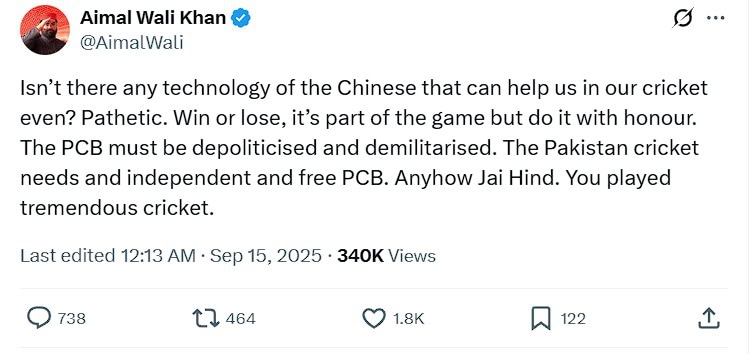I still can’t quite believe what I saw on my screen the other night. As I scrolled through social media during the Pakistan–India cricket match, I stumbled upon a tweet from none other than Senator Aimal Wali Khan. His words carried a weight that stopped me cold: “Jai Hind.”
Now, let’s be clear — this wasn’t just an ordinary cricket fan shouting for their team. This was a serving member of Pakistan’s Senate, a man elected to represent our state and its people. And yet, instead of rallying behind his own country, he chose to echo a slogan inseparably tied to India’s nationalism.
I ask myself: how is this even possible? How does someone holding constitutional office in Pakistan publicly use a phrase that symbolises the very state with which we have fought wars, faced decades of hostility, and still grapple over core issues like Kashmir? “Jai Hind” is not a harmless chant. It is India’s patriotic cry, tied to its military parades, political speeches, and collective identity. If an Indian senator were to shout “Pakistan Zindabad suddenly,” we all know the result — his career would collapse overnight, his party would expel him, the media would devour him, and agencies would move in swiftly—no second chances.

But here in Pakistan? Silence. Shrugs. A few angry voices online, but no real outrage where it matters. I find this deeply troubling. Are we so desensitised to political betrayal that even a senator glorifying an adversary’s slogan doesn’t shake us anymore?
I’m not arguing against freedom of speech. Citizens have every right to speak, debate, and even criticise the state. But senators are not ordinary citizens. They occupy positions of trust. They legislate, they oversee governance, they represent Pakistan on the national and international stage. With that responsibility comes an obligation to honour the very state they serve. Aimal Wali Khan’s “Jai Hind” wasn’t free speech — it was a deliberate act of political signaling.
The double standards cut deep. Our media often explodes with fury over minor celebrity slip-ups. Yet, here we have a senator openly choosing India’s slogan and the matter is treated as if it were an awkward joke. No press conferences, no parliamentary inquiry, no legal scrutiny. Why the silence? Is it fear of backlash from his party? Or a broader culture of selective accountability?
As a Pakistani, I feel betrayed. I imagine the soldiers who stand at our borders, the families who have lost loved ones in conflicts with India, the millions who live with the consequences of this rivalry. How must they feel when they see a lawmaker — someone meant to embody the state’s dignity — casually praising India in public?
It’s not about hating India or rejecting peace. I believe in dialogue. I think in people-to-people connections, in cricket diplomacy, even in cultural exchange. But I also believe in political honesty. If you are sitting in Pakistan’s Senate, you must be clear about which flag you serve. You can’t wear Pakistan’s coat of arms in the day and cry “Jai Hind” at night.
So what should be done? At the very least, the Senate must demand an explanation. Aimal Wali owes the people of Pakistan a clear answer: why did he say it, what did he mean, and where does his loyalty lie? This isn’t about silencing dissent — it’s about clarifying allegiance. Without that, every precedent we allow weakens the state further.
Because if tomorrow another senator follows his example, if slogans of our rivals become fashionable among lawmakers, then what remains of our institutions?
For me, this is not just about a tweet. It is about the meaning of representation, the fragility of loyalty, and the uncomfortable space between free speech and betrayal. If an Indian senator can never write “Pakistan Zindabad,” then why should a Pakistani senator get away with “Jai Hind”?
Pakistan deserves better. And we, the people, deserve clarity from those who claim to serve us.














